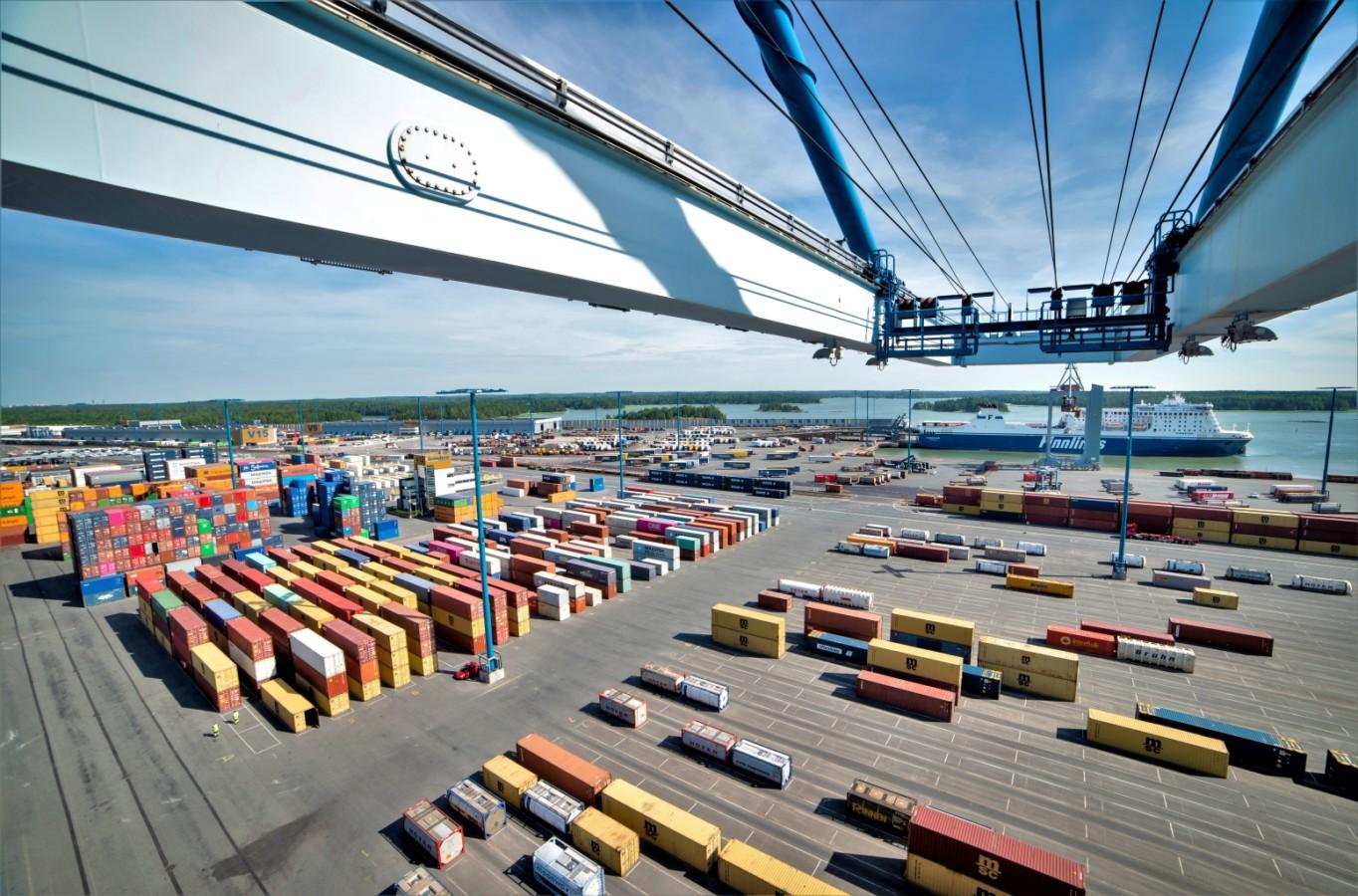
Vuosaaren sataman konttikenttää. Kuva: Helsingin Satama/Sanna Liimatainen
Biofuels and electric machinery, in particular, were identified as potential solutions for enhancing a carbon-neutral future of Vuosaari Harbour. The HNRY project creates goals for reducing the machinery emissions in the Harbour.
Vuosaari Harbour in Helsinki has surveyed the potential for adopting low-carbon machinery traffic. The survey was carried out by interviewing seven companies specialised in cargo handling and other logistics services in the Harbour. The Harbour has some 200 pieces of machinery for cargo handling that run primarily on fossil-based diesel. So far, the emissions of machinery have been reduced by optimising the use of the machinery and purchasing machinery that have better fuel efficiency qualities. Based on the interviews, gradual withdrawing from fossil fuels seems like a possible trend in the Harbour.
The low-carbon vision is supported by the action plans and emissions reduction goals of both the City of Helsinki and Port of Helsinki Ltd – Carbon-neutral Helsinki 2035 and Carbon-neutral Port 2035. In the Port of Helsinki, the goal is to reduce carbon dioxide emissions by at least 32% from the level of 2015. The reduction goal set for machinery is 60%.
Suitability and price of biofuel raise questions
In practice, moving to liquid biofuels would offer a relatively easy and quick way of reducing the emissions of the harbour machinery. For example, moving to renewable diesel was estimated to require mainly small changes to the Harbour’s distribution infrastructure.
However, respondents would like to have seen more information regarding the suitability of biofuels, particularly for older machinery. Proof of suitability was listed as desirable concerning the advanced HVO diesel, for example. Co-operation with machinery manufacturers and fuel producers is needed to study matters related to suitability, warranties and availability. At the moment, the price of biofuel is also a likely challenge for many harbour companies, since moving on renewable diesel would mean higher fuels costs compared to the engine oil used currently.
Electric machinery is arriving gradually
Electrification of machinery was seen as a long-term solution that would progress gradually as the machinery is renewed, starting with smaller and fully electric machinery, such as forklifts, or hybrid models. The benefits of electric machinery identified in the interviews included lower operating costs compared to diesel machinery and zero emissions during use, in terms of carbon dioxide emissions, local emissions that worsen air quality, and noise disturbances.
The electrification of machinery is particularly heavily influenced by economic factors. The purchase prices of electric machinery were considered generally higher than those of diesel machinery. Moving to a new type of power also requires infrastructural investments from the harbour companies.
The interviewees were also concerned with the uncertainties related to the battery charging, maintenance, performance and safety of the new type of power. Aspects such as low battery capacity, long charging times and the need to change batteries often were considered challenging in cargo port operations. Even though suitable machinery models are already available on the market, the selection was seen as partially lacking, particularly in the category of high-transmission machinery.
Towards carbon-neutral port machinery
Despite challenges, the interviews show that companies are willing to reduce the emissions of machinery logistics. This willingness is fuelled by personal motivation, corporate brand benefits, and the increased expectations of customers and shareholders regarding sustainability.
Based on the interviews, the work in Vuosaari Harbour will continue by assessing the increase in biofuels and electrification through expert information and experience-based knowledge, potential incentives, and co-operation. The goal is to prepare concrete goals for promoting carbon-free machinery logistics.
The interviews were carried out as a part of the 6Aika – Carbon-neutral and Resource-wise Business Parks (NHRY) project coordinated by the City of Helsinki. The project also involves the Cities of Espoo, Vantaa, and Turku, as well as VTT Technical Research Centre of Finland Ltd, the University of Turku, and Turku Science Park Ltd. The shared project promotes the climate and circular economy goals of industrial areas and worksites on a large scale. The goal is to produce operating models that can be extensively utilised by industrial and business parks. The project is funded by the European Regional Development Fund.
Summary of how low-emission machinery traffic can be promoted in the companies in Vuosaari Harbour (PDF). You can also read the leaflet version on Issuu.
Further information:
Saara Pellikka
City of Helsinki, ‘Carbon-neutral and Resource-wise Business Parks (HNRY)’ project
saara.pellikka(at)hel.fi, +358 (0)40 671 2078
